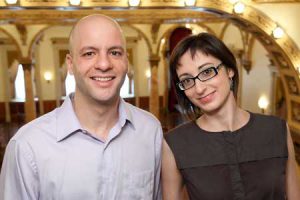
Grad students create forum for discussion with the Science & Policy Exchange
By Katherine Gombay
Monika Rak is worried about what she describes as dangerous scientific “half-knowledge,” especially when it comes to people who aren’t scientists themselves but who are socially engaged. She cites the controversy around genetically modified foods, which has led to their near prohibition in Europe, when, according to Rak, we need these foods in order to be able to feed the hungry people of the world.
That’s why the doctoral student in chemistry has given up much of her free time for close to a year to work with other graduate students from McGill, Concordia, the École de technologie supérieure, and Université Laval to organize the 2011 Science and Policy Exchange. The daylong meeting, on Sept. 23, will bring together leaders from government, industry and the research community to talk about science and policy issues affecting Quebec. And its primary purpose, above and beyond stimulating discussion and exchange, is to encourage graduate students in science to take a more active role in making future science policy.
“Scientists are happy spending most of their time in their labs,” said Rak. “Even though they know what should be regulated… they rarely talk with policy-makers.”
Rak is hoping to create a venue where science policy can be discussed, something that she believes isn’t happening enough within universities. “I want to put science policy into the conscious minds of graduate students because it will be something that they will be touched by personally,” Rak explained. “When I started talking to other graduate students about the Science and Policy Exchange, they didn’t understand why they should care about science policy. But when I told them that policy-makers would make decisions about what kinds of chemicals and equipment they could use and about what kind of research was going to get funded, it seemed to click immediately.”
The overarching theme for the meeting is Quebec’s research future both from an economic and societal point of view. Discussions in the morning will focus on broad questions such as who should fund research, and who should profit from it; and how the university culture can adapt to favour wealth generation. The afternoon is designed for panels on more specific subjects such as renewable energy, biodiversity and assisted reproduction. Thomas Mulcair, Deputy-Leader of the New Democratic Party of Canada, will give the closing address.
Rak is happy about the new friends she has made in the process of organizing the Exchange. “Life isn’t just what you do in your lab and what papers you put out,” she said. “You have to become involved in your community and in things that may not interest you very much to start with, like policy and politics and government.” By creating this venuefor debate about science policy Rak is hoping to inspire more of her fellow students to feel the same way.
The Science & Policy Exchange takes place on Friday Sept. 23; Faculty Club (3450 McTavish). Lunch is provided. For more information and to register go to www.sp-exchange.ca
